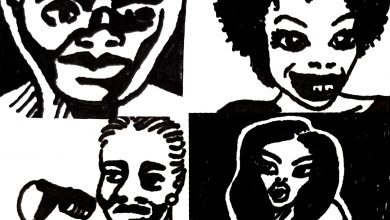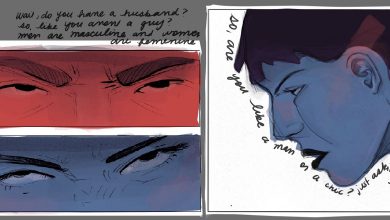Feminism 101: What is Tone-Policing?

Illustration by Laura Yau.
At the heart of oppression is emotion. Experiencing, acknowledging, and understanding the brutal and perpetual injustices of this world is at best not pleasant, and at worst, self-destructive. The uncontrollable anger. The consuming hopelessness. The gnawing self-doubt. The clenching frustration. These are all raw, expected reactions to experiencing and learning about injustices happening internally and externally to people. Our experiences are validated by our emotions, and our emotions are validated by our experiences. There is not one without the other.
So when a person is discussing experiences and issues of injustice, it is unfair and dismissive to invalidate their side of the conversation because they are speaking with passion and emotion. If anything, their emotions should only further validate their thoughts and ideas.
Tone-policing is the act of silencing a person’s ideas and thoughts on the basis of their emotional tone and therefore ignoring the actual content of their message. Tone-policing results in a one-sided or terminated conversation, oppressing the voices of the marginalized. It produces stagnation, not progress; ignorance, not compassion.
Criticizing the tone with which oppressed peoples fight for their rights and respect is a privilege used to excuse the powerful from accepting responsibility and issuing the appropriate restitution. Using tone as an excuse to not listen to people’s views puts the burden of enacting change and promoting activism on the already silenced marginalized communities.
Tone-policing dangerously ensures that the fight for equality becomes solely the responsibility of the oppressed. It unfairly alleviates the responsibility on the powerful to listen to and understand their stories with compassion. It protects the powerful’s privilege by forcing the marginalized to calmly, “rationally,” inform the people in power of their unjust experiences, at the threat of not being heard. Tone-policing only further oppresses the already marginalized by requiring them to refurbish their opinions and stories so that they are more pleasant for the powerful to hear. It thwarts an opportunity for oppressors to recognize and fix their oppressive behaviors by compassionately listening to these emotionally compelling arguments and stories. It forces the oppressed to emotionally separate themselves from their emotionally charged hardships, and it numbs the oppressors from having the compassion to listen. Tone-policing forces people to restrict emotion and compassion, that which makes us most human.
Tone-policing is a way to silence emotion in the movement for equality. To silence emotion in the movement is to silence the movement entirely.
Disagreements may lead people to immediately dismiss or patronize the other person, but it is more useful to ask questions and be open-minded about the answers received. If something does not make sense right away, pause to think before getting frustrated and shutting down the other person’s words. Listen; don’t invalidate what is not yours to invalidate. Put yourself aside. Because their story is theirs, and only theirs, to tell.




